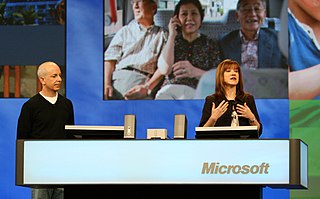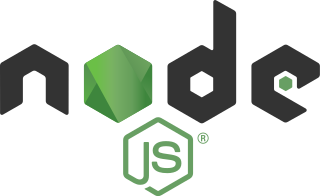Related Research Articles
Netscape Communications Corporation was an independent American computer services company with headquarters in Mountain View, California and then Dulles, Virginia. Its Netscape web browser was once dominant but lost to Internet Explorer and other competitors in the so-called first browser war, with its market share falling from more than 90 percent in the mid-1990s to less than 1 percent in 2006. Netscape created the JavaScript programming language, the most widely used language for client-side scripting of web pages. The company also developed SSL which was used for securing online communications before its successor TLS took over.
Microsoft Developer Network (MSDN) was the division of Microsoft responsible for managing the firm's relationship with developers and testers, such as hardware developers interested in the operating system (OS), and software developers developing on the various OS platforms or using the API or scripting languages of Microsoft's applications. The relationship management is situated in assorted media: web sites, newsletters, developer conferences, trade media, blogs and DVD distribution.

F# is a functional-first, general purpose, strongly typed, multi-paradigm programming language that encompasses functional, imperative, and object-oriented programming methods. F# is most often used as a cross-platform Common Language Infrastructure (CLI) language on .NET Core, but it can also generate JavaScript and graphics processing unit (GPU) code.

Matthew Dillon is an American software engineer known for Amiga software, contributions to FreeBSD and for starting and leading the DragonFly BSD project since 2003.
The Active Template Library (ATL) is a set of template-based C++ classes developed by Microsoft, intended to simplify the programming of Component Object Model (COM) objects. The COM support in Microsoft Visual C++ allows developers to create a variety of COM objects, OLE Automation servers, and ActiveX controls. ATL includes an object wizard that sets up primary structure of the objects quickly with a minimum of hand coding. On the COM client side ATL provides smart pointers that deal with COM reference counting. The library makes heavy use of the curiously recurring template pattern.
Windows Mobile is a discontinued family of mobile operating systems developed by Microsoft for smartphones and personal digital assistants.

SharpDevelop is a discontinued free and open source integrated development environment (IDE) for the .NET Framework, Mono, Gtk# and Glade# platforms. It supports development in C#, Visual Basic .NET, Boo, F#, IronPython and IronRuby programming languages.
Windows Presentation Foundation (WPF) is a free and open-source graphical subsystem originally developed by Microsoft for rendering user interfaces in Windows-based applications. WPF, previously known as "Avalon", was initially released as part of .NET Framework 3.0 in 2006. WPF uses DirectX and attempts to provide a consistent programming model for building applications. It separates the user interface from business logic, and resembles similar XML-oriented object models, such as those implemented in XUL and SVG.

Windows Vista is an operating system produced by Microsoft as a member of the Windows NT family of operating systems for use on personal computers. Development was completed on November 8, 2006, and over the following three months, it was released in stages to computer hardware and software manufacturers, business customers and retail channels. On January 30, 2007, it was released worldwide and was made available for purchase and download from the Windows Marketplace; it is the first release of Windows to be made available through a digital distribution platform. The release of Windows Vista came more than five years after the introduction of its predecessor, Windows XP, the longest time span between successive releases of Microsoft Windows desktop operating systems.
Azure RTOS ThreadX is a highly deterministic, embedded real-time operating system (RTOS) programmed mostly in the language C.

Microsoft's Professional Developers Conference (PDC) was a series of conferences for software developers; the conference was held infrequently to coincide with beta releases of the Windows operating system, and showcased topics of interest to those developing hardware and software for the new version of Windows.
George Varghese is a Principal Researcher at Microsoft Research. Before joining MSR's lab in Silicon Valley in 2013, he was a Professor of Computer Science at the University of California San Diego, where he led the Internet Algorithms Lab and also worked with the Center for Network Systems and the Center for Internet Epidemiology. He is the author of the textbook Network Algorithmics published by Morgan Kaufmann in 2004.

Parallel Extensions was the development name for a managed concurrency library developed by a collaboration between Microsoft Research and the CLR team at Microsoft. The library was released in version 4.0 of the .NET Framework. It is composed of two parts: Parallel LINQ (PLINQ) and Task Parallel Library (TPL). It also consists of a set of coordination data structures (CDS) – sets of data structures used to synchronize and co-ordinate the execution of concurrent tasks.

Microsoft Visual Studio is an integrated development environment (IDE) from Microsoft. It is used to develop computer programs, as well as websites, web apps, web services and mobile apps. Visual Studio uses Microsoft software development platforms such as Windows API, Windows Forms, Windows Presentation Foundation, Windows Store and Microsoft Silverlight. It can produce both native code and managed code.
Component Object Model (COM) is a binary-interface standard for software components introduced by Microsoft in 1993. It is used to enable inter-process communication object creation in a large range of programming languages. COM is the basis for several other Microsoft technologies and frameworks, including OLE, OLE Automation, Browser Helper Object, ActiveX, COM+, DCOM, the Windows shell, DirectX, UMDF and Windows Runtime. The essence of COM is a language-neutral way of implementing objects that can be used in environments different from the one in which they were created, even across machine boundaries. For well-authored components, COM allows reuse of objects with no knowledge of their internal implementation, as it forces component implementers to provide well-defined interfaces that are separated from the implementation. The different allocation semantics of languages are accommodated by making objects responsible for their own creation and destruction through reference-counting. Type conversion casting between different interfaces of an object is achieved through the QueryInterface method. The preferred method of "inheritance" within COM is the creation of sub-objects to which method "calls" are delegated.
In multithreaded computer programming, asynchronous method invocation (AMI), also known as asynchronous method calls or the asynchronous pattern is a design pattern in which the call site is not blocked while waiting for the called code to finish. Instead, the calling thread is notified when the reply arrives. Polling for a reply is an undesired option.
Windows Mobile 6.5 is a stopgap update to Windows Mobile 6.1 intended to bridge the gap between version 6.1, that arrived in 2008, and the then yet-to-be-released Windows Phone 7.

Node.js is an open-source, cross-platform, back-end, JavaScript runtime environment that executes JavaScript code outside a web browser. Node.js lets developers use JavaScript to write command line tools and for server-side scripting—running scripts server-side to produce dynamic web page content before the page is sent to the user's web browser. Consequently, Node.js represents a "JavaScript everywhere" paradigm, unifying web-application development around a single programming language, rather than different languages for server- and client-side scripts.

Mono is a free and open-source project to create an Ecma standard-compliant .NET Framework-compatible software framework, including a C# compiler and a Common Language Runtime. Originally by Ximian, it was later acquired by Novell, and is now being led by Xamarin, a subsidiary of Microsoft and the .NET Foundation. The stated purpose of Mono is not only to be able to run Microsoft .NET applications cross-platform, but also to bring better development tools to Linux developers. Mono can be run on many software systems including Android, most Linux distributions, BSD, macOS, Windows, Solaris, and even some game consoles such as PlayStation 3, Wii, and Xbox 360.
References
- ↑ C# Threading Handbook, ISBN 1-86100-829-5
- ↑ Visual Basic .Net Threading Handbook, ISBN 1-86100-713-2